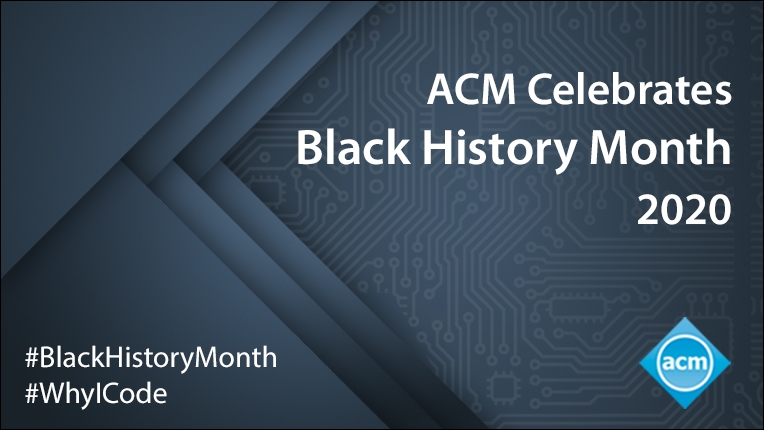#BlackHistoryMonth #WhyICode
ACM is celebrating Black History Month this year by posting responses from African American ACM Fellows, volunteers and members to questions about their careers in computing. We'll learn about what inspired them to pursue careers in computing, how does underrepresentation shape the experiences of African Americans in computing, and what can be done to combat racial bias in computing and technology. This webpage feautures the responses we have received.
Dorian Arnold
Q: Were there any African American computing leaders who inspired you early on in your life or career?
A: Unfortunately, 20+ years ago the few black computing leaders and pioneers, like Annie Easley, Mark Dean, Skip Ellis and others, were unknown to me (and likely to most). Hopefully, today it is easier for young African Americans to see and learn about computing role models that look like them, not just the hugely aspirational figures that help them shoot for the stars, but also ones closer to their local environments who serve as teachers, professors, research advisers and mentors.
Q: What advice would you give to young students of color entering the computing profession?
A: To use a trite cliché, knowledge is power. And information is knowledge! Identify allies, mentors, supporters and confidantes, recognizing that these people may or may not “look like you.” What matters most is that you trust the people in your corner to have your back as well as to have the professional credibility to lend constructive perspectives. And then leverage this powerful information source early and often to shed light on the things you have experienced and are currently going through and to inform your decision processes to help get you to the places you aspire to be.
Q: How would you suggest organizations foster an environment where young people from all backgrounds know their ideas and contributions are valued?
A: Organizations often maintain a myopic focus on the technical research, education or business agenda – even when discussing “inclusive environments,” “inclusive education,” “inclusive classrooms,” etc., the focus generally remains technical. To truly include and welcome people in a way that makes them feel at home and comfortable in their educational or professional lives, organizations should establish forums that allow young people from all backgrounds to share who they are entirely and engender cultures that embrace everyone in their entirety. If I feel truly embraced by the people in my environment, I will trust that the people in my environment value who I am and, therefore, also value the ideas and perspectives I bring to the table.
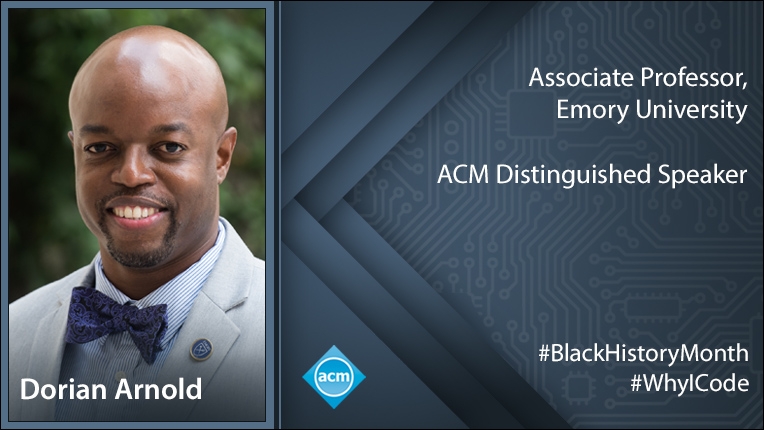
Elodie Billionniere
Q: What inspired you to pursue computing as a profession?
A: Early in my childhood, I was intrigued with numbers and enjoyed solving puzzles. With that in mind, I started out as a math major with an interest in the actuarial profession until one of my girlfriends asked me to take the introductory Java programming course with her so she would not feel alone. Since I had not taken any elective courses yet, I went along with her and ended up enjoying the exploration of computational thinking in various contexts. Hence, the following semester, I changed my major to computer science-math and took additional computing courses. Although the following year, my friend changed her major to management information system after struggling with the data structure course, I persisted and continued on as a computer science major in graduate school.
Q: Were there any African American computing leaders who inspired you early on in your life or career?
A: Prior to graduate school, I did not know of any African American computing leaders, but also I was not searching for them. In graduate school, I was a MGE@MSA AGEP scholar and through this NSF-funded scholarship program I had the opportunity to attend conferences such as the Institute on Teaching and Mentoring, ACM Richard Tapia Celebration of Diversity in Computing, and Grace Hopper Celebration where I finally got exposure to many underrepresented minority groups in the computing field including Black computing leaders. From these national meetings, I was able to network with my peers and to have access to mentorship from scholars who look just like me.
Q: What impact has the underrepresentation of African Americans in computing had on your career? Have you had to navigate specific challenges or biases related to this?
A: From my educational journey, I had already been acclimated to an environment where I was always one of the very few, if not the only one, in my computing courses. The adversities associated with discomfort, biases, and loneliness felt at first, were put aside to work harder and create opportunities for others.
Q: What advice would you give to young students of color entering the computing profession?
A: Confidence is key as people may try to down play your efforts and ideas and sometimes try to take away your shine. Also, a support network is essential to navigate through the profession. Last but not least, take advantage of each opportunity presented as you never know which door will lead you toward your desired goals and dreams.
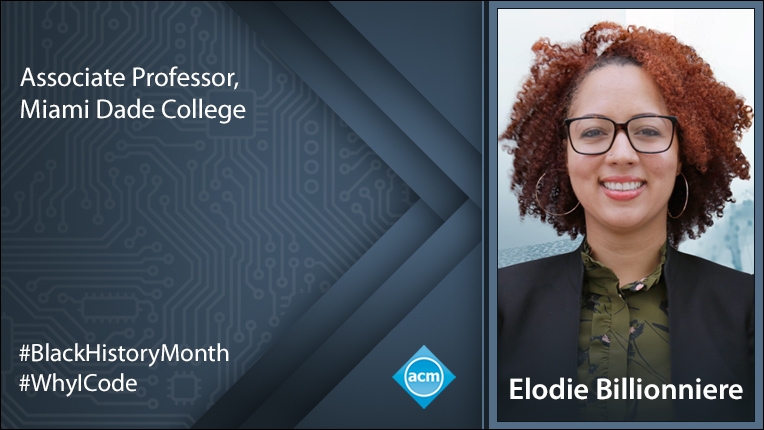
Brian Blake
Q: What inspired you to pursue computing as a profession?
A: I am a unique case. I started programming in 4th grade on an Apple IIe computer that my father bought for his service station business. It was collecting dust in our family room so I started to experiment with it. Back then, there were no disk drives, CDs, or flash drives, there were cassette tapes or you would basically transcribe programs from magazines. I typed many computer programs from a magazine that my parents purchased for me. Along the way, I learned how to understand programs and also how to debug based on typos that I inadvertently introduced. By 5th grade, I knew that I wanted to be a computing professional and later attended Georgia Tech in EE/CS. I later participated in a list of programs to support up-and-coming engineers and computer scientist and some programs geared toward African-Americans or Underrepresented minorities more broadly.
Q: Were there any African American computing leaders who inspired you early on in your life or career?
A: Early in my education (i.e. high school), there were no real African-American role models. I went to a private Catholic high school (Benedictine Military School) and an early teacher was Father Anthony who encouraged me to take 4 years of computing courses in computer graphics, simulation, Basic language, and PASCAL language. As an undergraduate, a later role model was Professor Gary May, an African-American electrical engineering professor, Georgia Tech. He used computing techniques for semiconductor manufacturing. He is now Chancellor at UC-Davis, so he role modeled me as a computer professional and now as an academic administrator. Later, Professors Valerie Taylor, Bryant York, Roscoe Giles, and the late Skip Ellis collectively mentored and role-modeled my entire generation of computer science professors.
Q: What advice would you give to young students of color entering the computing profession?
A: Although the field is not accustomed to African-American computer scientists, I personally have found individuals in the field to be open to mentorship. Although the systems might feel a bit isolated for young computing professional who often will be the only one of their demographic in a group, I have found that establishing a broad set of mentors from all background to be extremely helpful. Although initially by necessity, I had excellent mentors from all background although later I found established senior African-American role models.
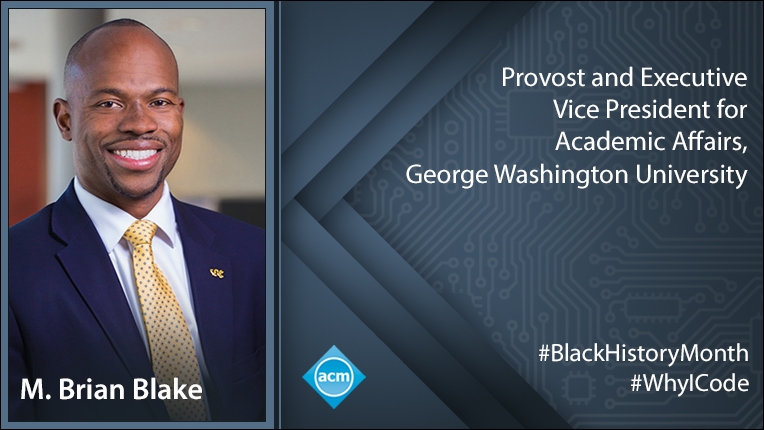
Joel Branch
Q: What inspired you to pursue computing as a profession?
A: From early on, I've been a creative, a tinkerer, and a futurist. When I started using computers (we were blessed to have one at home in the early 80s), I quickly discovered that they were a perfect outlet for all my pursuits. When the movie "Jurassic Park" was released, showcasing groundbreaking photorealistic animation, I knew my adult profession would entail computing. I never became a visual effects artist, but life isn't over :-)
Q: Were there any African American computing leaders who inspired you early on in your life or career?
A: The first Black (African-American, Carribean, etc.) computing leaders I was exposed to were the Computer Science professors at Howard University (class of 2001), and they clearly inspired me to pursue a PhD in Computer Science. Throughout my graduate work, I met other notable Black computing leaders who continue to inspire me. One is my mentor Prof. Juan Gilbert at the University of Florida. His drive is off the charts, as are his contributions to accessibility and electronic voting. My dear friend Dr. Jamika Burge has, among a range of other things, co-founded blackcomputeHER.org, giving Black females a strong voice in computing. My most recent source of inspiration is Dr. Charles Isbell, Dean of Computing at Georgia Tech. Charles is super sharp, and we share a strikingly similar sense of humor and hairstyle. So he's who I want to be when I grow up. I'm blessed to know these and a range of other Black computing leaders. I feel accountable to them, they keep me on my toes.
Q: What impact has the underrepresentation of African Americans in computing had on your career? Have you had to navigate specific challenges or biases related to this?
A: Being underrepresented has definitely come with challenges. It's surely an uphill battle when you show up to present a paper at a conference and the workshop chair assumes you're technical support; similar incidents have also happened. My intellect and opinions have definitely been prematurely waved off at times. What's helped me through this? I'm very keen on acknowledging my feelings and measuring my own self-worth to stay balanced -- I know what I know and don't know. Thankfully, I've had family and support networks for encouragement. It's also helped that I get a sense of identity from a range of sources other than "work." I love mentoring students and professionals, making people laugh, constantly aiming to be a better husband and father, and reigning supreme in "Halo" for 20 years (we play Xbox in this house).
Q: What advice would you give to young students of color entering the computing profession?
A: First, you have as much right to contribute to the computing profession as anyone else. Never concede to the suggestion that you "don't belong." Second, the world needs you, even if they don't know it. Look, computing is still shaping our society, our lenses on society, and equity in society. It's essential that everyone has a seat at the table, and bring their unique viewpoints and experiences in creating the future. Three, give back! Be a mentor, be involved in your communities. Don't just give back where it concerns computing. Strive to be an outstanding citizen in as many aspects as you can.
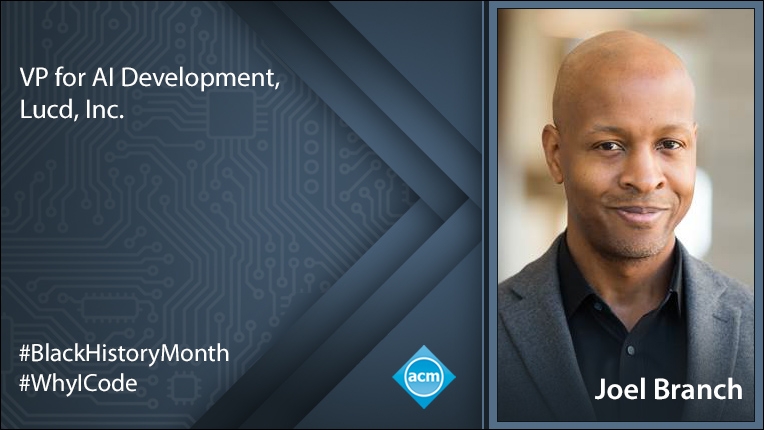
Julian Brinkley
Q: What inspired you to pursue computing as a profession?
A: I consider myself to be a bit of a futurist, growing up reading the works of future-focused authors like Arthur C. Clarke and Isaac Asimov. I would say reading the fictional works of these authors, which in many ways are grounded in science, put me on the path that I continue to travel today. I was also fortunate to grow up in a household that encouraged creativity and intellectual pursuits. Both of my parents were instrumental in cultivating my passion for creativity and technology, and they helped me to channel this into scientific endeavors. Computing just happened to be what I naturally gravitated towards.
Q: Were there any African American computing leaders who inspired you early on in your life or career?
A: Unfortunately, I was not introduced to the concept of African Americans in computing until graduate school. My hope is that with the efforts of initiatives to broaden participation in STEM fields that this becomes less of an issue for those interested in computing. That stated, growing up I gravitated towards African American scientists and inventors like George Washington Carver and drew considerable inspiration from their stories.
Q: What impact has the underrepresentation of African Americans in computing had on your career? Have you had to navigate specific challenges or biases related to this?
A: This is a really interesting question for me as I feel like the answer to the question would change depending upon when it was asked. I have spent a significant part of my adult life in industry prior to transitioning into academia. As a software developer who often worked in or with distributed teams, the underrepresentation of African Americans was not something that was glaringly apparent in many circumstances; I was fortunate in many cases to work on diverse teams. Given that I spent much of this time working remotely with clients located around the globe, ethnicity just didn’t seem to be a significant factor. The clients that I worked with were primarily concerned with my ability to satisfy a given technology-related business need. I would say that the underrepresentation of African Americans became more of an issue for me when I returned to graduate school and observed the very limited number of students of color who were similarly pursuing a graduate degree in computing. I actually felt more isolated in many respects during much of this period than I did when I was physically isolated while working remotely. I think the biggest challenge that I faced from this was overcoming my own concerns about my ability to successfully complete an advanced degree in a discipline where only a small number of those who had done so previously looked like me.
Q: What advice would you give to young students of color entering the computing profession?
A: I would say that computing is inherently based on what you know. My advice to anyone entering the profession is to literally treat it like a craft; work on your craft consistently and diligently and become as skilled as possible. I find that if you know your stuff, that tends to supersede someone’s preconceived notions about the abilities of people who may look like you. Beyond that, if you’re having trouble getting through the door, create your own building. By that, I mean that computing is similar to a trade in that there is tremendous opportunity for the craftspeople of the profession to literally create many of their own opportunities.
Q: How would you suggest organizations foster an environment where young people from all backgrounds know their ideas and contributions are valued?
A: For me, the biggest indicator I look at when evaluating the environment of an organization is who works there. If there are very few women, then I immediately think that the organization either purposely or inadvertently has failed to cultivate an environment that supports women in the workplace. I take the same approach when looking at ethnic diversity. It’s easy to speak about diversity and what your organization values, but if you have a lack of diversity in your ranks, I believe that to be telling. Diversity, or a lack thereof, sends a message about whose ideas and contributions are really valued in an organization.
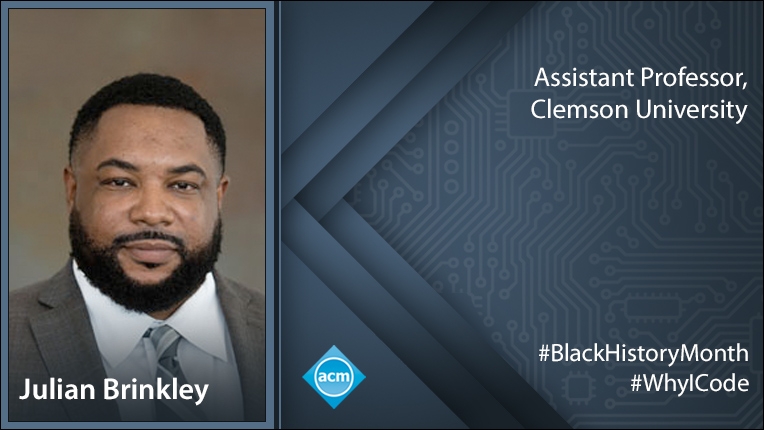
Diana Burley
Q: What inspired you to pursue computing as a profession?
A: I wanted to have a voice in shaping the future of society. Advances in computing are driving that future and I had an unwavering desire to ensure that the technology was reflective of the diversity in our society. That passion still energizes me every day.
Q: What impact has the underrepresentation of African Americans in computing had on your career? Have you had to navigate specific challenges or biases related to this?
A: Absolutely. I face challenges every day. I do not allow myself to dwell on them. Instead, I work harder and let my work and my work ethic speak for itself.
Q: What advice would you give to young students of color entering the computing profession?
A: Do your work. Surround yourself with people who will help you grow, remembering that sometimes growth is painful.
Q: How would you suggest organizations foster an environment where young people from all backgrounds know their ideas and contributions are valued?
A: Aspiring computing professionals need to see that people from a variety of backgrounds, races, and experiences can thrive in your organization. Does the organizational leadership and culture embrace and promote diversity in all its forms? Are diversity practices meaningful and tied to mission achievement?
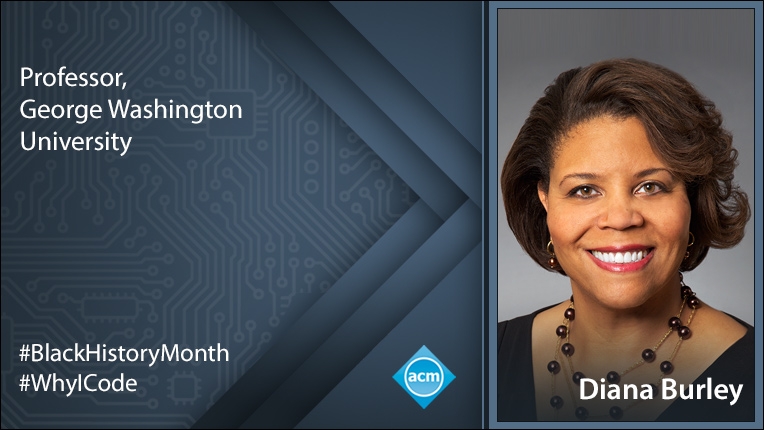
Chris Crawford
Q: What inspired you to pursue computing as a profession?
A: At the age of 13, my aunt gave me my first computer. Soon after I received the machine, it stopped loading. Knowing my parents did not have the funds to repair it or buy a new computer, I became determined to fix it myself. After spending hours learning how to use various MS-DOS commands, I successfully reformatted the hard drive and installed a new operating system. Thus began my journey in the world of computer science.
Q: Were there any African American computing leaders who inspired you early on in your life or career?
A: While attending the University of Alabama, I was inspired by Dr. Monica Anderson, who recruited me to work in her robotics research lab as an undergraduate researcher. During graduate school, I studied under Dr. Juan Gilbert, who also inspired me to pursue a career in Computer Science.
Q: What advice would you give to young students of color entering the computing profession?
A: I encourage young students of color to gain experience working on interdisciplinary projects. As the landscape of computing shifts, gaining interdisciplinary skills will become increasingly important. I would also encourage young students to spend a significant amount of time sharpening their technical skills early in their careers.
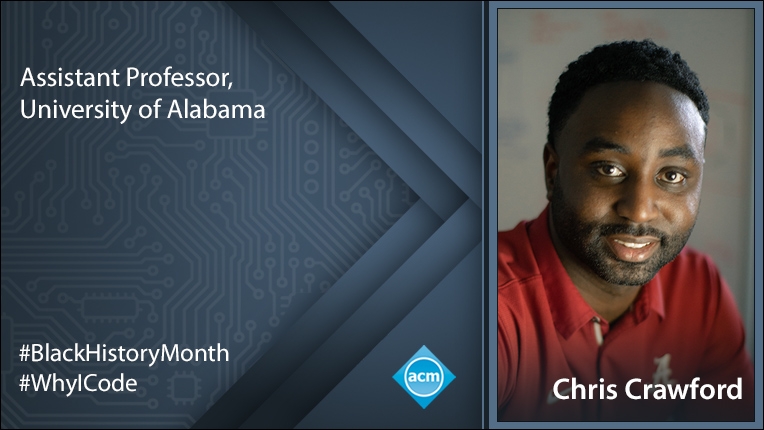
Shaundra B. Daily
Q: What inspired you to pursue computing as a profession?
A: I actually didn’t have computing on my radar. I went into engineering with the intention of pursuing criminology, and found a passion for imagining, designing and building technologies for education. Now, as a professor and business owner, I am beyond excited to utilize the skills I’ve learned to create technologies that can improve the social, emotional, and physical lives of diverse communities.
Q: What impact has the underrepresentation of African Americans in computing had on your career? Have you had to navigate specific challenges or biases related to this?
A: I’m quite sure there have been times when either my gender or my ethnicity has impacted my journey. However, I made the choice a long time ago that other people’s biases weren’t my business. What I mean to say is that I can’t control how people, think, feel or act when they see me. All that I can do is bring my best every day, serve as an example where I can, and challenge inequalities where possible.
Q: What advice would you give to young students of color entering the computing profession?
A: The core of who you are shouldn’t be hidden or assimilated. What you bring to the table is uniquely you. No one else can accomplish what you can.
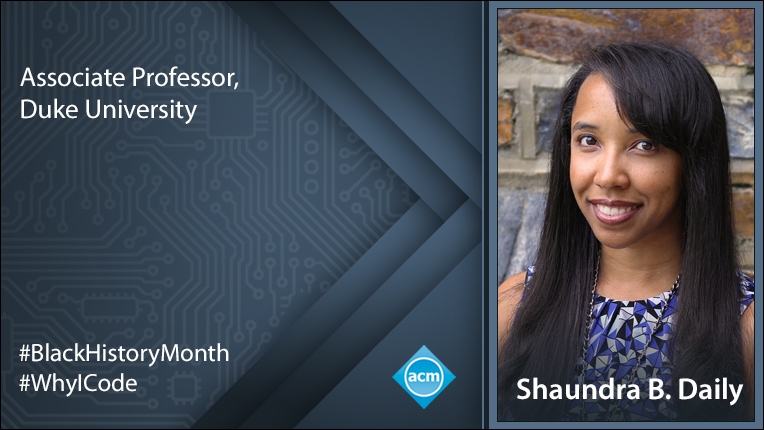
Siobahn Day
Q: What inspired you to pursue computing as a profession?
A: My parents inspired me to pursue a computing profession. My father is a computer programmer, and my mother was a specialist at one of the largest computing companies in the world. As an only child, I loved puzzles and video games. With technology in my home, I soon went from the video game console to playing games on the computer. That rapidly evolved into building websites and learning how to code.
Q: Were there any African American computing leaders who inspired you early on in your life or career?
A: Aside from my parents, the African American leaders who inspired me early on were Dr. Elva J. Jones and Dr. Rebecca Caldwell at Winston-Salem State University. That was the first time I had women who looked like me teach me computing and nurture my passion for computing.
Q: What impact has the underrepresentation of African Americans in computing had on your career? Have you had to navigate specific challenges or biases related to this?
A: There is an impact that is felt by being African American in computing and also a woman. These impacts, many of which can sometimes be dismissive, propel me to work even harder. There are always challenges when biases are involved. I believe that it's not my job to change minds with words but to do the work that no one can deny. That will speak for itself and create pathways for others along the way.
Q: What advice would you give to young students of color entering the computing profession?
A: I would tell young students of color to believe in themselves. Make sure you do your research and have a support system. Knowing what this field entails will help you identify areas of growth and opportunities to shine. Remember, you have what it takes to succeed. Apply yourself, work hard, and you will reach new heights. Also, you will need the support of others on your journey, such as mentors, family, friends, etc.
Q: How would you suggest organizations foster an environment where young people from all backgrounds know their ideas and contributions are valued?
A: I would suggest organizations first treat others in the same manner in which they expect others to address them. People need to know that you view them as valuable. We must never think too highly of ourselves and be open to other perspectives. There is always something to learn from everyone.
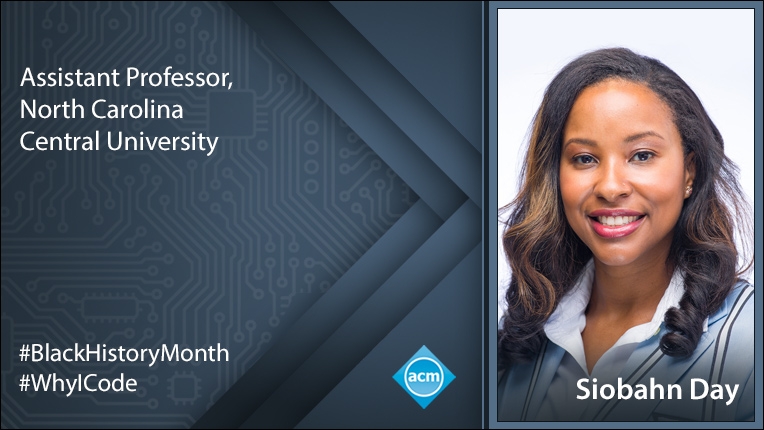
Wanda Eugene
Q: What inspired you to pursue computing as a profession?
A: Computing as a profession for me means variety! As a student I saw that I could solve relevant problems that I care about in so many domains because of the pervasiveness of computing. I have had the opportunity to pursue my passion in education, in social justice, in global affairs, and other different areas that have piqued my interest.
Q: What advice would you give to young students of color entering the computing profession?
A: Don’t be afraid to bring your presence, your full self, with all its complexities and passions to the profession; it makes everything better!
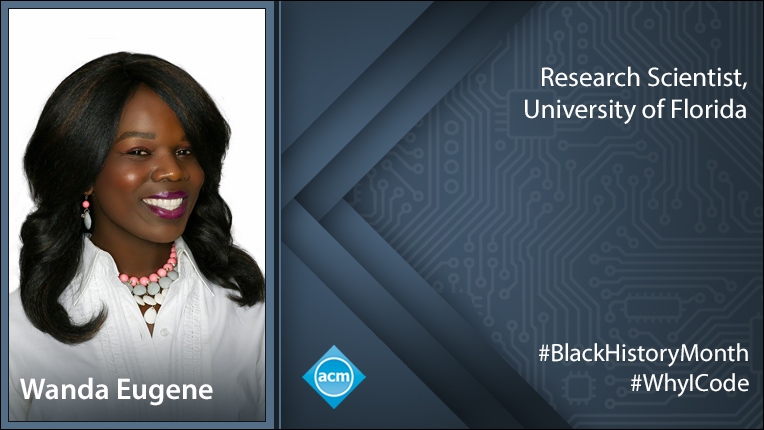
Juan Gilbert
Q: What inspired you to pursue computing as a profession?
A: As a kid, I loved science. I really wanted to be a scientist. I was the first in my family to go to college, so I didn’t have very much guidance. I entered college as a chemistry major. I took advanced chemistry as a freshman and one day a senior chemistry major told me that I was good at chemistry, I would do well in the program and when I graduated I would go to graduate school. I said, “Go where? graduate school? You mean I have to go to school again?” Again, I was the first in my family to go to college, so I didn’t know anything about graduate school. I thought you went to college so you could get a job. So, I changed my major to systems analysis or computer science because I had taken a programming course and I enjoyed it, plus I knew a senior who was graduating and got a job. So, I didn’t directly pursue computing as a profession all along. It just happened along the way.
Q: Were there any African American computing leaders who inspired you early on in your life or career?
A: None. I didn’t meet an African-American in computing with a PhD until I was near the end of my PhD. There were so few of us at that time. I was isolated and thought I was the only one for years.
Q: What impact has the underrepresentation of African Americans in computing had on your career? Have you had to navigate specific challenges or biases related to this?
A: This has an impact on all of us, but I didn’t let that stop me. I decided that I was going to do something about it. So, when I became a professor, I said I would recruit more African-Americans, Hispanics and other underrepresented students into my lab and into the field.
Q: What advice would you give to young students of color entering the computing profession?
A: If you are isolated, don’t let that stop you. This is an exciting field with the potential for high reward and high impact. You can find others. You can start by looking at http://www.iaamcs.org.
Q: How would you suggest organizations foster an environment where young people from all backgrounds know their ideas and contributions are valued?
A: You start by telling your members that this is important to you and that you are willing to learn about their ideas, issues, etc. This all starts with a conversation and understanding that people have differences and that’s what makes them special and will make your organization stronger.
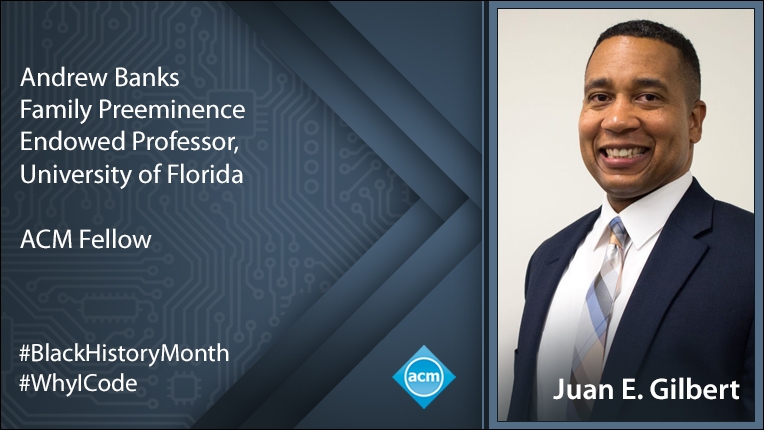
Christan Grant
Q: What inspired you to pursue computing as a profession?
A: I’ve been fortunate that my dad is a software engineer. On days when I was sick, I would get to accompany him and use an extra computer at his workplace. I learned how to use terminal commands to load nibbles. Growing up in the 80s and 90s, all cartoons had a character who was into computers, robotics, and virtual reality. I actually wanted to be like the Nina Turtles or a Power Ranger, so I thought learning Computer Science would be a step in the right direction. In 9th grade, I took a programming class and got hooked. We learned Scheme, and I wasn’t that great at it, but I liked the challenge.
Q: Were there any African American computing leaders who inspired you early on in your life or career?
A: The first real conversation I had with Black computer science leaders was on a bus to Disney World at the 2007 Tapia Conference in Orlando, Florida. I sat by Dr. Quincy Brown and Dr. Shaundra Daily. By the end of the trip they helped me plan a life and career in graduate school and opportunities for afterward. Almost immediately after, I’ve was mentored by Dr. Juan Gilbert, and I worked under Dr. Tyrone Grandison. Since then, I've sought to help others like me get excited by the problems they could solve with computer science.
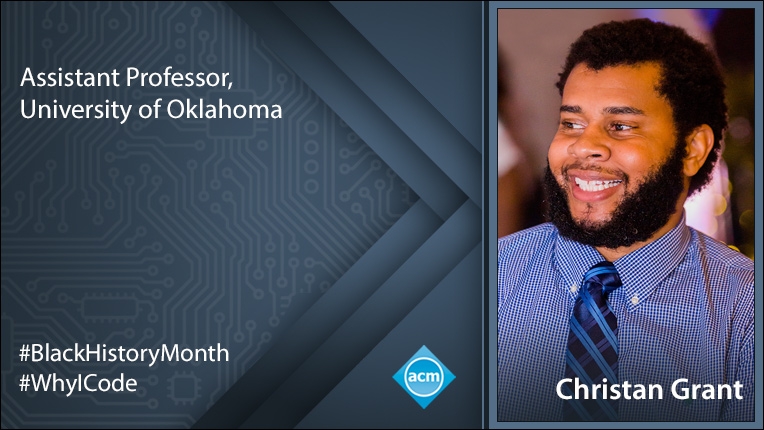
Jason Grant
Q: What inspired you to pursue computing as a profession?
A: A lot of my inspiration to pursue a career in computing came from my dad. He was an information technology manager and director for several years, and often brought home several computers to test out settings and configurations. Whereas some kids grew up with a television in their bedroom, I had a computer. This is commonplace now, especially with the advent of laptops, tablets, and smartphones, but was not so common in the 90s. I spent a significant amount of time shadowing my father in his workplace, and later worked for a technical support office during the summers of my high school years. I have basically been pursuing a career in computing since then.
Q: Were there any African American computing leaders who inspired you early on in your life or career?
A: Yes. In 2006, I spent the summer at the University of Colorado, Boulder and completed my first research experience in the SMART program. To my surprise, I learned that my research mentor, the late Clarence “Skip” Ellis, was the first African-American to earn his PhD in computer science and the first African-American to be elected as a Fellow to the ACM. For an individual with so many accolades, he was incredibly generous with his time and resources. Working with him that summer was transformational.
Q: What advice would you give to young students of color entering the computing profession?
A: The computing profession in itself is intellectually challenging and even group projects can feel isolating at times. When you compound this with the fact that people of color are well underrepresented in the industry, it can feel even more isolating. Therefore, I would encourage students entering the profession to seek a community and don’t be afraid to ask for help. Next, it’s impossible to keep up with all of the latest programming languages, machine learning techniques, etc., engage in something that promotes continual learning. And lastly, find something fun and relaxing to do a few times a week after work or on the weekends to avoid burnout.
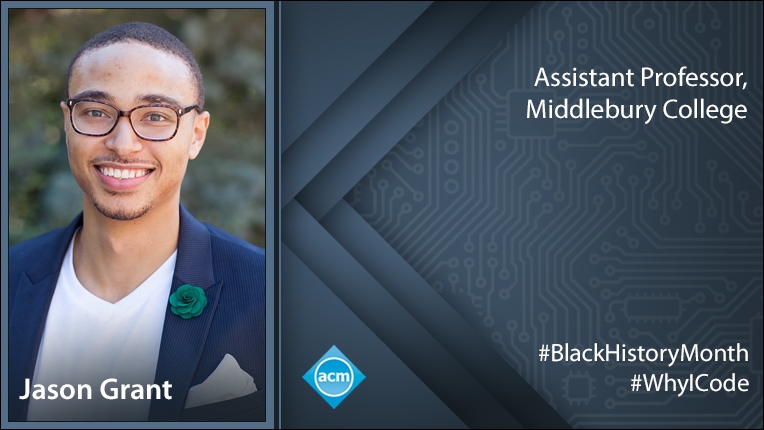
D. Fox Harrell
Q: What inspired you to pursue computing as a profession?
A: I can answer this question with the following text, adapted from the preface of my book, Phantasmal Media: An Approach to Imagination, Computation, and Expression (MIT Press, 2013). It starts with an idea I had as a child: Television, everyone said, was already compromised—it rotted minds and turned people into couch potatoes. So I wondered if there would be any way that I could help whatever medium came next to play a more ethical role in society. I cannot say that this book lives up to the dream that musing sparked. Yet this book might be considered a step in pursuing a more mature vision rooted in that early dream, with its dual aims of helping people see the unconscious forces that shape media images and helping them use computing—in some ways the next media after television, one could say—to affect society for the better.
As a teenager, I learned of college majors such as “logic and computation,” “symbolic systems,” and “cognitive science.” How wonderful it sounded to combine computer science with fields such as philosophy, mathematics, and psychology. Those majors also all involved artificial intelligence (AI). What a dangerous-sounding area of study—all wrapped up in the aesthetic sensibility of a computer game I loved called Neuromancer (based on the William Gibson novel). By earning a hybrid computer science/mathematics/philosophy [Bachelor of Science] degree at the same time as a degree in art [Bachelor of Fine Arts] (which included learning to work with images, text, sound, video, computer-based media, and more), I would not have to leave any of my educational interests behind. … I later came to realize a flaw of my childhood dream: the medium alone is not what is ethical or unethical. Computing, which has indeed now become a medium after television, is connected to a complex web of previous media, culture, behavior, preexisting power relationships, and more. Nonetheless, computer science and the other fields I have studied have enabled me to follow my dream of inventing new media with the aim of bettering the human condition. That path would eventually lead me from Carnegie Mellon as an undergrad to NYU’s Tisch School of the Arts for my Master’s degree, UCSD’s Computer Science and Engineering department for my PhD, and to MIT’s Computer Science and Artificial Intelligence Laboratory (CSAIL), where I am now Professor of Digital Media and Artificial Intelligence.
Q: Were there any African American computing leaders who inspired you early on in your life or career?
A: My father inspired me. He was an educator and avid early adopter of technologies. Since he was a teacher, I had access to a personal computer during summers as a youth. It set me on my path and enabled me to learn to code. By junior high school, taking advantage of the public library, I was able to learn about topics such as symbolic programming, philosophy of AI and mind, how to code, and more.
I did learn many lessons from African American leaders in other fields that I apply to my computing work. From the musician Nina Simone and writer James Baldwin, I learned how art can be a form of pursuing positive social change. From speculative fiction authors Samuel R. Delany and Octavia Butler, I learned how worldbuilding can be a form of social reflection; and from Amos Tutuola I learned that these worlds we build can challenge the rules imposed by unfair social hierarchies. From the composer Charles Mingus I learned how to think about how top-down structure relates to bottom-up interaction (in his case improvising musicians, in my case users of computing systems). From the artists Adrian Piper and David Hammons I learned that cultural production can be an intellectual, conceptual act that can be evocative and poetic at the same time. When I work in areas such as AI-driven interactive narrative or virtual/augmented/mixed reality I take all of these lessons I’ve learned to heart.
Q: What impact has the underrepresentation of African Americans in computing had on your career? Have you had to navigate specific challenges or biases related to this? What advice would you give to young students of color entering the computing profession?
A: Sometimes my research was grounded in a valued different perspective than others in my field. Other times it meant that the topics I care about deeply were undervalued. For instance, I have been in some venues where HCI work addressing social inequality has been seen as a marginal topic, of interest only to various underrepresented groups – in contrast to novel technical interface features that were celebrated. However, in other venues, the new interface feature might seem like an incremental advance, whereas novel ways of modeling of social issues of oppression may seem centrally important to the human condition. Ultimately, the important point here is that multiple types of work are valuable and we should be able to appreciate, and even integrate, research from diverse perspectives with an aim of producing innovative results.
Back when I was a student I faced some challenges too. At times, some faculty, staff, and students had a deficit model of my abilities. That is, they assumed I would be a poor student until I proved that I was a top student. For instance, when I once proactively asked an advisor about resources such as additional documentation of particular platform I was told “we don’t have remedial resources at this university.” In fact, the platform we were using was new and I was being proactive – looking to get started on the project early. It was often difficult at the beginning of courses to find groups for projects (pursuing an additional degree in Art also probably fueled some stereotypes) – but by the end of the course the same students who excluded me asked me for help on their problem sets and understanding course concepts. It was frustrating because that process would repeat itself at the start of the next term with new classmates.
In terms of advice I suggest the following. Ultimately, I think that every student should look at their own background as a positive resource for their computing (and other work). Our life experiences, not limited to race/ethnicity, can provide powerful insights in how to be learners and doers in ways that can transform our societies and world.
Q: How would you suggest organizations foster an environment where young people from all backgrounds know their ideas and contributions are valued?
A: First, we can affirm people by having images and artifacts in the physical spaces where people work representing an array of backgrounds. Second, we can crucially provide opportunities where technical research can be applied to the issues that people care about (e.g., in diverse communities; when fighting against oppression). Third, even better, we can recognize that technical and scientific work can be grounded in, and benefit from, diverse perspectives. In other words, the broader impact of research can be a part of the scientific inquiry – not just an application or form of outreach. Fourth, we can realize that all technical systems are based in culture and make some of those underlying cultural assumptions explicit rather than implicit. This practice can help us avoid issues such as unfair algorithmic bias and enable innovations that arise by grounding research in unique cultural perspectives that may have been overlooked or excluded in the past. Finally, by working collaboratively and integrating these diverse perspectives, we can go further together than any of us could have alone.
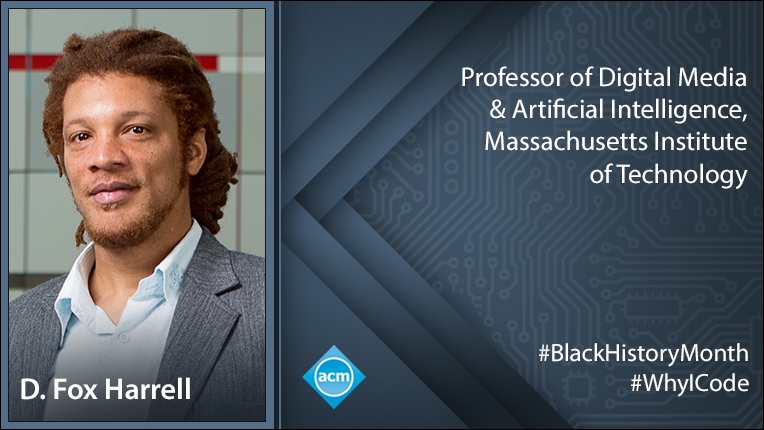
Andrea E. Johnson
Q: What inspired you to pursue computing as a profession?
A: I always loved tinkering as a kid. If there was something broken or needed putting together, I took on the job. As a child, my father worked in the IT department of a bank and my mother was a secretary but they always encouraged my brother and me to try new things, so it was nothing for me to imagine taking on computing. At some point, we got a computer and I loved playing the games and puzzles on it. For my senior project in high school, I decided to program a spelling bee game and I think that sealed the deal of what I’d do in college. I never imagined what I could do with Computer Science but the intrigue and challenge over the horizon were enough to lure me into it as a major. After many experiences at Spelman College, meeting Mathematician Dr. Etta Z. Falconer, learning from Dr. Andrea W. Lawrence (first African American to get a Ph.D from Georgia Tech), and working with Dr. Juan E. Gilbert as an REU, it was easy to dream of a future in computing.
Q: Were there any African American computing leaders who inspired you early on in your life or career?
A: Before undergrad, I didn’t know anyone other than my father working in tech. After stepping through Spelman’s doors, I kept meeting them like they were a normal occurrence and not the rare gems they were. People like Bryant York, Juan Gilbert, Andrea Lawrence, Valerie Taylor to name a few, who were firsts in most regards but were humble and open about their journeys and their passion to help others.
Q: What impact has the underrepresentation of African Americans in computing had on your career? Have you had to navigate specific challenges or biases related to this?
A: The underrepresentation of Africans Americans has been both a challenge and a blessing. While it has opened doors to new places for me, it has also invited me into isolated, lonely and sometimes hostile territories. It has challenged me to embrace change and difficulties because in turn those things also helped me grow significantly. I learned that I was fearfully and wonderfully made and the only thing that could stop me from achieving the goals set before me was me. You learn to pivot and think creatively when you stop thinking about barriers and focus on opportunities to solve a new challenge.
Q: What advice would you give to young students of color entering the computing profession?
A: Figure out your purpose and your passion and set your sights there. Life is hard no matter what road you choose, so choose the one that gives you joy and helps you impact the world around you.
Q: How would you suggest organizations foster an environment where young people from all backgrounds know their ideas and contributions are valued?
A: The best advice I have comes from one of my favorite sayings, “when someone shows you who they are, believe them." If you want young people to believe you’re welcoming and listening, your environment should reflect that; where your organization spends its money and its time are good indicators of what it cares about.
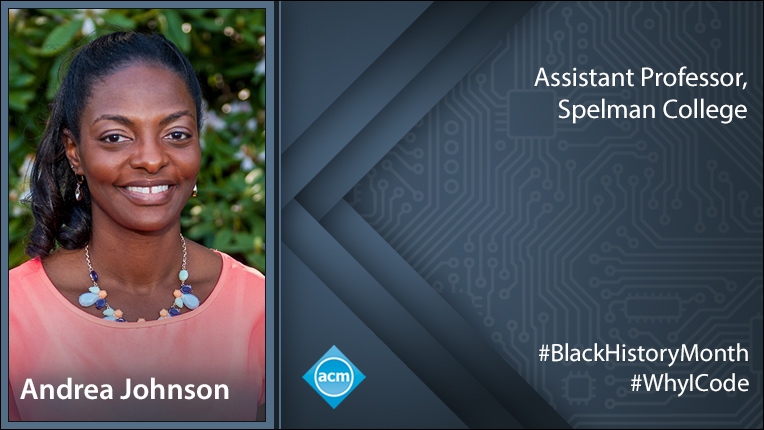
Aqueasha Martin-Hammond
Q: What inspired you to pursue computing as a profession?
A: I did not know about computer science as a potential career path until high school. However, I did really like math and science. I was exposed to computers in elementary and middle school through some of my classes and other experiences and programs. My parents and other family members (though not computer scientists) were very supportive of my interests and made sure I participated in activities to help me reach my goals. I remember attending a teacher professional development workshop with my mom, who is a teacher, where they were giving training on computers. My mom mentioned to the instructor that I liked computers, and they recruited me as an assistant for the remainder of the training to help the teachers walk through the activities. In high school, my parents purchased a family computer, and I set it up and spent time tinkering. I would spend time creating flyers and other documents for different activities and organizations in the community. When it was time to apply for college, I searched for careers that involved all the things I was interested in, and computer science was on the list. I do not know if I fully understood at that time what a degree in computer science would mean for me. However, I saw computing as a way to use my fondness of problem-solving and tinkering to help people and benefit society. So, there were a lot of people and experiences that led me to choose computing as a profession.
Q: Were there any African American computing leaders who inspired you early on in your life or career?
A: Early on, I was inspired most by people in my family. While I am the first to pursue a career in computer science, my family has had a significant influence on my journey. The first time I met other African Americans in computing was at Tougaloo College. Tougaloo College is an HBCU in Mississippi, and I earned my undergraduate degree there from the Mathematics and Computer Science department. Most of my math and computer science professors at Tougaloo were African American. Being at Tougaloo helped to lay the foundation for my career path in computing. When I started college, I had no aspiration of going to graduate school, doing research, or going into academia. I was not even aware that this was an option. I have always been one to look for and take advantage of opportunities, but sometimes you are not aware that an opportunity exists. However, the faculty at Tougaloo saw potential in me and took the time to mentor me and make me aware of opportunities outside my original plan. I became mindful of programs on and off campus that provided me with the tools, networks, and opportunities to become involved in research, apply for graduate school, and pursue a career in academia. During graduate school, I was mentored directly by several African American computing leaders--for example, Juan Gilbert, Cheryl Seals, Jakita Thomas, and Yolanda Rankin, who mentored me and helped me in different ways during that time. I have met and continue to meet many more African American computing leaders who inspire me for various reasons.
Q: What impact has the underrepresentation of African Americans in computing had on your career? Have you had to navigate specific challenges or biases related to this?
A: Completing my undergraduate degree at an HBCU, I was not aware that there was an underrepresentation of African Americans in computing since that was not my reality at the time. However, once I left Tougaloo, I became aware that there are fewer African Americans in the field. I have been fortunate to benefit from mentors, advisors, and supervisors that have helped at various parts of my career, and I still benefit as a faculty member. However, like others, I have and continue to face challenges and biases. Instead of letting them stop me, I use those experiences as motivation and a reminder of one of the reasons I am doing what I am doing.
Q: What advice would you give to young students of color entering the computing profession?
A: My advice is to stay focused on your goals, put in the effort to meet them, and persevere. If computing is a profession that interests you, there are so many opportunities out there, and there are people that will support you in your journey. You may face challenges and setbacks, but do not let that drive you away. Build a good support system of family, mentors, peers, and anyone else that is in your corner. Continue to learn and grow even beyond the classroom and academics and find ways to move forward so that you can work on the things that excite you.
Q: How would you suggest organizations foster an environment where young people from all backgrounds know their ideas and contributions are valued?
A: Be genuinely open to new ideas and perspectives. Let people know their voices are valued and build an environment that demonstrates you are receptive to listening and learning about different points of view and that you will act when needed.
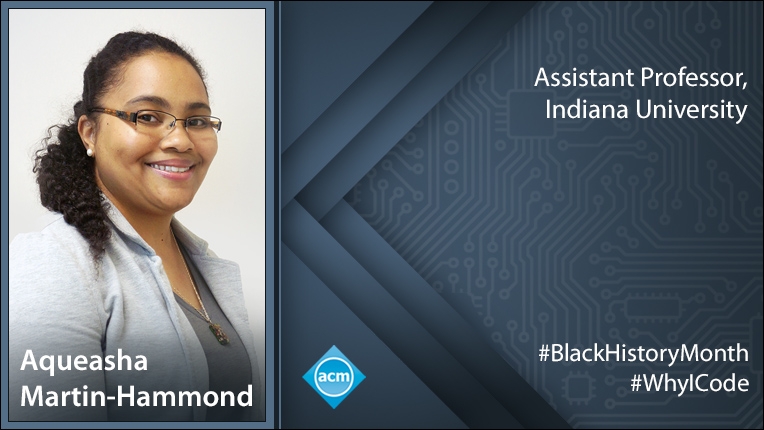
Jerome McClendon
Q: What inspired you to pursue computing as a profession?
A: My father first inspired me to pursue a profession in computing. After being discharged from the Air Force, he earned an Associate’s Degree from DeVry Institute, where he took computing and electronic courses and learned how to program in Basic and Assembly Languages. So, at a young age I was introduced to computers, and I can’t remember not having a computer in the house starting with a Commodore 64. By the time I entered junior high, my father had taught me how to program in both Assembly and Basic, and we were building circuits for calculators. The one thing my father consistently said that really motivated me was that I had an obligation to take what he had taught me and go a step farther. And that’s what I did when I graduated with my Ph. D. in Computer Science.
Q: Were there any African American computing leaders who inspired you early on in your life or career?
A: Other than my father, I had never met another African American who had a background in computing until I met Dr. Juan Gilbert on a visit to Auburn University for its high school Engineering Day. I can remember him showing us a demo from his lab, and I was impressed because here was someone who looked like me who had achieved the highest degree in his field. He inspired me to major in Computer Science and to attend Auburn University. Fast forward a few years later, I joined Dr. Gilbert’s lab in my junior year, and he introduced me to human centered computer and machine learning research while constantly telling me to get my Ph.D.
What also inspired me was being in Dr Gilbert’s lab with other African Americans and going to conferences like Tapia and African American Researchers in Computing, which is now the National Society of Blacks in Computing. These experiences had a big impact on me because growing up, everything I saw on television related to computer science featured white males, and the majority of my college professors were either white males or internationals. It was easy for me to start to believe this field wasn’t for me but meeting other African Americans in the field doing extraordinary research gave me a goal to strive for.
Q: What impact has the underrepresentation of African Americans in computing had on your career? Have you had to navigate specific challenges or biases related to this?
A: I have always had to deal with non-African Americans being skeptical of my computing skills and intellectual capabilities. I first noticed it in high school when I was competing in a computing contest. For that contest I developed a graphing calculator in Visual Basic; I did not win the contest not because there were better projects but because during the interview session, one of the judges did not believe I was capable of writing the code, that I either received outside help or downloaded it from somewhere. Even as a professor, I have had colleagues accuse me of not writing code myself but taking it from others.
These incidents have had a tremendous impact on my career because I know that the doubt coming from my non-African American colleagues stems from their conclusions about African Americans as a whole. So I’m saddened and angered, but at the same time I use those emotions as motivation. That is why my mission as a professor has been to intentionally create opportunities for African Americans in computing through recruiting, teaching and research.
Q: What advice would you give to young students of color entering the computing profession?
A: When thinking about advice to give to students of color, I’m reminded of the quote by Dr. Martin Luther King, Jr.: “If you can’t fly then run, if you can’t run then walk, if you can’t walk then crawl, but whatever you do you have to keep moving forward.” I would go on to say that you must understand that you will face major obstacles in the computing field because of the color of your skin, but don’t let that deter you. You must be willing to do whatever it takes to keep moving forward because future generations need both your voice and presence at the table today to shape the future of computing.
Q: How would you suggest organizations foster an environment where young people from all backgrounds know their ideas and contributions are valued?
A: If organizations are serious about creating an environment that is accepting of all people and their ideas along with recognizing their contributions, then they must stop treating diversity as an item on a to-do list or as a promotional tool for a once-a- year celebration. Organizational diversity to me is a daily action that starts with listening to the voices of the underrepresented and not being dismissive of their ideas as well as highlighting their contributions. My final suggestion is to stop using and allowing others to use the pipeline as an excuse for the lack of diversity. There are qualified underrepresented candidates out there. It is just that your organization must be willing to accept that they may not look like you or have the same social economic background as you or have gone to a university that you are familiar with. But that doesn’t make their potential to contribute to the field of computing any less than yours.
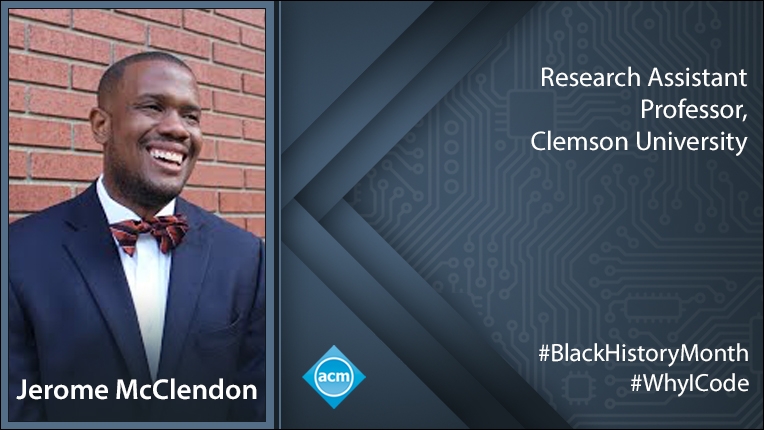
Kyla McMullen
Q: What inspired you to pursue computing as a profession?
A: As a child, computers and technology always fascinated me. I’d see TV shows where someone was building a computer or creating a robot and I remember thinking “wow! I would love to do that one day! I HAVE to find out how it works." To add to my curiosity, I grew up in the era when computers were beginning to become an offering in schools' curricula. A school of 200 students was expected to share 6 computers. Needless to say, when I got my limited time with the computers, I was clicking every button and opening every program, determined to figure out the secrets of how it worked.
Q: Were there any African American computing leaders who inspired you early on in your life or career?
A: Prior to high school, I did not have exposure to any African American computing leaders. I always admired my Uncle Gary, who built my family’s first computer when I was about 14. He was self-taught and would assemble computers for friends and family. When I reached Computer Science in high school, I was absolutely floored that our teacher was a young, cool, Black man, which was contrary to the prevalent media portrayal of computer scientists as being old, geeky, and white. I remember having the distinct thought that “Wow, Mr. Ware is cool and he’s doing this. I can do this too!” I didn’t have any exposure to Black computing leaders in college until my junior year when I was encouraged by the Meyerhoff Scholarship Program to attend the Richard Tapia Celebration of Diversity in Computing. Not only did I see amazing leaders in computing, they encouraged me to go to graduate school and reassured me that I too could be as successful as them.
Q: What impact has the underrepresentation of African Americans in computing had on your career? Have you had to navigate specific challenges or biases related to this?
A: The lack of inclusion of African Americans in computing has led to some isolating experiences, perhaps due to the fact that many people are not used to us being in technical roles. Oftentimes, in technical spaces, I am the only or one of a few Black people and/or women in the room. Many of my technical peers had never worked with Black women before, so there was a reluctance to study with me or be in project groups together. I’ve been questioned about my presence in technical spaces (as though I was in the wrong place/didn’t belong there). On more than one occasion, fellow conference attendees have asked me to bring out more food or to give them directions, assuming that people of color only hold service roles in technical spaces. The graduate chair of my PhD program actually suggested that I consider education or psychology as a major, insinuating that I didn’t belong in the computer science department. These biases, which people of other demographics do not have to deal with, place a huge emotional and mental burden on people of color, just for existing. Every person of color in a technical space develops coping mechanisms to be able to persist in a space that constantly sends you messaging that “you don’t belong here.”
Q: What advice would you give to young students of color entering the computing profession?
A:
- You belong (period).
- Keep learning.
- Read about the newest technologies, platforms, and development tools.
- Seek advice from mentors early and often. Don’t be afraid not to know something. Google exists for a reason :-)
- Seek community to help you through challenging times and be community for other people during their tough times
- Get out from behind the computer every once in a while and take care of your body
Q: How would you suggest organizations foster an environment where young people from all backgrounds know their ideas and contributions are valued?
A: Follow the great proverb: “put your money where your mouth is." Companies and organizations often tout diversity but have no tangible line items that support these initiatives. If you have groups for people from underrepresented identities, they should not be under-resourced and under-staffed, as they often are.
It is also important to have and enact actual consequences and repercussions for members of the organization whose actions consistently go against the inclusive environment that the organization so boldly advertises. Organizations need to reward people who contribute to creating and maintaining inclusive environments, and give young people from all backgrounds access to a mentor to foster their development. It is also important to reward collaboration over competition.
Finally, believe young people of color when they tell you about their experiences and don’t immediately assume they are “reading too much into a situation” or “overreacting."
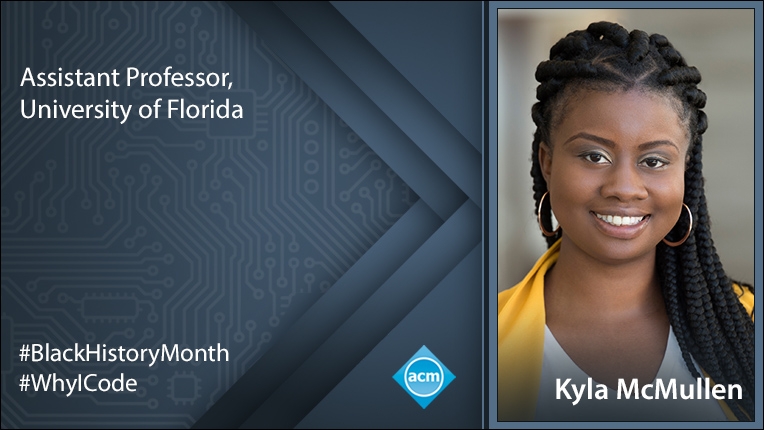
Fay Cobb Payton
Q: What inspired you to pursue computing as a profession?
A: I studied industrial and systems engineering (ISYE) as an undergraduate student. The curriculum included computer science courses, and the use of applications to solve simulation, process improvement and statistics problems. It was this coding and the lure of problem solving that inspired me.
Q: Were there any African American computing leaders who inspired you early on in your life or career?
A: My parents (neither of which are “computing leaders”) inspired me. My father is a natural mathematics wizard the while my mother is a brilliant linguist. As a high school student, I completed a summer internship at a national lab and observed a number of African American engineers and scientists in action.
Q: What impact has the underrepresentation of African Americans in computing had on your career? Have you had to navigate specific challenges or biases related to this?
A: This had/has a significant impact on my career. There were and continues to be naysayers. Of course, I continue to face challenges and bias – particularly as an African American woman. Much of the research in the space tends to lend itself to grit and resilience of those underrepresented with minimal focus of structural and institutional/organizational barriers. I advise young students to observe leadership and how leaders “lead”. Leaders set the tone and climate on how challenges are resolved or loom; both of which impact career trajectories.
Q: What advice would you give to young students of color entering the computing profession?
A: This depends if they are entering at the point of undergraduate studies or professional careers. In brief, be prepared to work. Much of what we communicate to young students is about the outcome and not the process. I would suggest that students of color understand the process of completing the degree, the rigor needed to complete and be prepared to do the work. This means “yes” having technical aptitude, but you need collaboration, communication and interpersonal skills. I also know that it important to find positive outlets (e.g., peer groups, a hobby, exercise).
Q: How would you suggest organizations foster an environment where young people from all backgrounds know their ideas and contributions are valued?
A: Make time to connect, and gain context to understand different backgrounds. I could say much more about this topic. BUT….trust is critical to showing how people are valued.
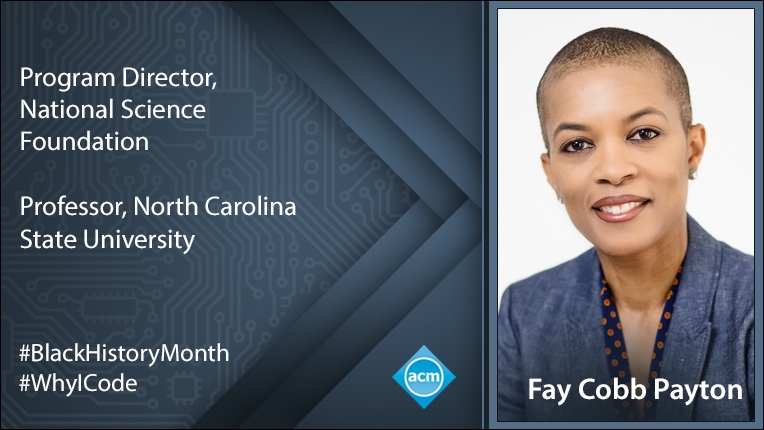
Sekou L. Remy
Q: What inspired you to pursue computing as a profession?
A: I was introduced to computing by my very supportive family in middle school, and I was lucky enough to join the first class of who had computer science as an elective at my high school. That said, my paternal grandfather is probably the one who I would tag as the person who inspired me to consider computing as a profession. I was in middle school and he was in his seventies when he was studying Mathematics Education at Medger Evers. Mathematics was my entry point into computing, and he always challenged me to learn and do more in math.
Q: Were there any African American computing leaders who inspired you early on in your life or career?
A: Too many to list them all! A few I met as an undergraduate student were:
- Mark Dean
- Curtis Clark (the mathematician who introduced me to research)
- Ayanna Howard
- Edward Tunstel
The most passionate of these of probably Juan Gilbert though but both Bryant York and Valerie Taylor are pretty compelling as well.
Q: What impact has the underrepresentation of African Americans in computing had on your career?
A: This question is quite deep, but succinctly I'll say that I've had to cope with isolation, overt racism, and shouldering "invisible" burdens. I'll also add that I was lucky enough to experience kinship and camaraderie which came from encountering others (including allys) who understood my experiences.
Q: Have you had to navigate specific challenges or biases related to this?
A: Yes.
Q: What advice would you give to young students of color entering the computing profession?
A: Read widely, provide documentation (not just in your code, take notes!), travel, pursue education not just good grades, be prepared to work, be prepared to be flexible, develop an actionable plan, get great mentors (including peer mentors), learn how to work in teams, explore the theory of mathematics... and/or music... and/or languages, do at least three internships and do them in different places (see what works for you).
Q: How would you suggest organizations foster an environment where young people from all backgrounds know their ideas and contributions are valued?
A: Permit these people to explore their ideas in safe spaces. Encourage healthy self-criticism. Help them to understand how to evaluate ideas rigorously. Acknowledge great ideas/contributions, and permit them to identify great ideas/contributions from others. Celebrate play.
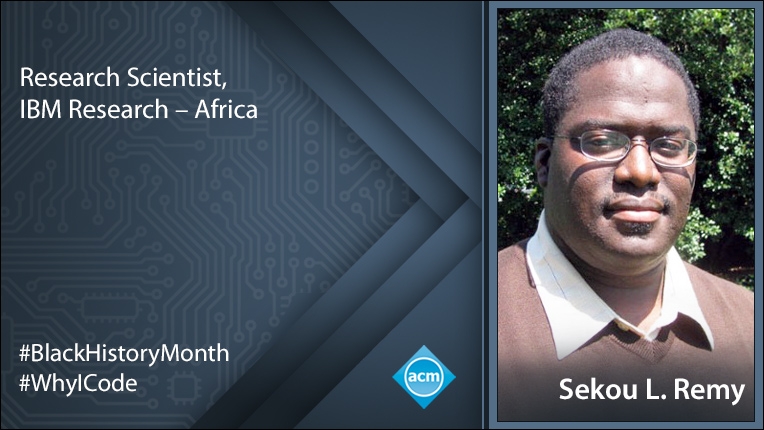
Nicki Washington
Q: What inspired you to pursue computing as a profession?
A: I always loved to "tinker," and computing allowed me to continuously challenge myself to do more. I also love working with people, so while I began my career in industry, I quickly realized how much I loved working with students and helping to prepare them to become the next generation of computer scientists and engineers who would change the world. There's an indescribable joy of witnessing students grow from freshmen with minimal knowledge to seniors and graduates ready to conquer any challenge they face. Knowing that you were a part of their journey is extremely rewarding.
Q: Were there any African American computing leaders who inspired you early on in your life or career?
A: My mom was a computer programmer at IBM for her entire career. On her first day of work, she met a small group of other Black men and women in new employee orientation who were also programmers. They developed lifelong friendships and all had kids who are around the same age. They've served as not only my village and support system but also my role models in computing.
Q: What impact has the underrepresentation of African Americans in computing had on your career? Have you had to navigate specific challenges or biases related to this?
A: It has impacted me in various ways. There are a lot of unnecessary challenges and problems by being "the only" or "one of the few." There is bias, racism, and discrimination that I've experienced and continue to experience. My work is questioned, as well as me as a computer scientist, professor, and researcher. In 2020, I refuse to call this all "implicit" or "unconscious," because it's not. People know what they are doing and saying many times. They simply don't care. I've had to learn to advocate and fight for myself plenty of times, while also having to deal with issues of being called the "angry Black woman," "intimidating," "aggressive," or my personal favorite, that I have "no gratitude." These are things that people in the majority demographics will never have to endure or understand because they never have to exist in a place where few people (if anyone) look like them. It is frustrating, infuriating, and exhausting. Nevertheless, I persist; not just because I deserve to be here, but because other Black women and girls do too. If I don't continue to disrupt the status quo and agitate for them and me, then who will? This is also why my mother was such an invaluable role model for me. None of this is new. She had to endure the same. I've had to endure the same. My former students who are Black women are enduring the same. When will it change? When enough people in the majority demographic say enough is enough and believe, support, and advocate for Black women in the field.
Q: What advice would you give to young students of color entering the computing profession?
A: Find your voice and use it. You and you alone control your narrative. Never let anyone else tell you who you are, what you should be doing, and how you should "exist." Don't play small to make others comfortable with your presence. Agitate. Disrupt.
Q: How would you suggest organizations foster an environment where young people from all backgrounds know their ideas and contributions are valued?
A: In order to truly create such an environment, cultural competence has to be a priority from the top down. This means that organizations should be focused on hiring employees who demonstrate their cultural competence and how they are working actively to be inclusive and value diversity and equity. It can't just be "checking a box," which too many organizations still look to do. In addition, high expectations should be placed on those in the majority demographics to demonstrate this. The only way things will change is if those in the majority do the work. This also means that companies should place high expectations of cultural competence on prospective interns and new employees. This, in turn, places more expectations on college and university computing departments to focus on it as well. Only then will we start to see a real paradigm shift. There's a ton of work that needs to be done at the university level, and industry has the ability to hold departments accountable when it comes to not just preparing the next generation of grads with requisite computing skills, but also the requisite cultural competence to help them institutionalize this work at a greater level.
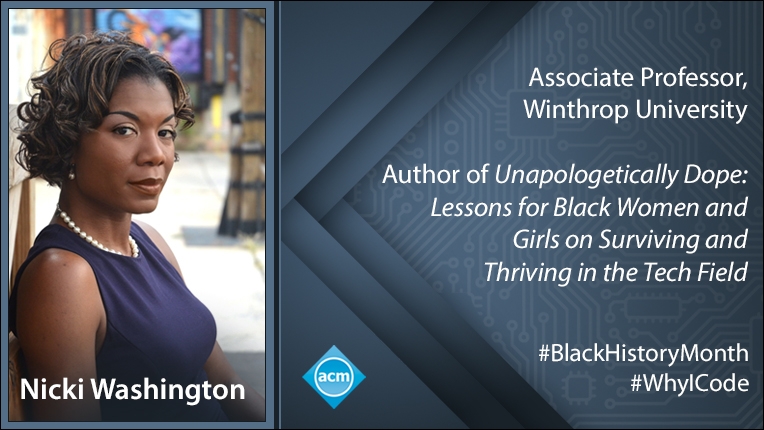
ACM Celebrates #BlackHistoryMonth 2020
ACM is celebrating Black History Month this year by posting responses from African American ACM Fellows, volunteers and members to questions about their careers in computing. We'll learn about what inspired them to pursue careers in computing, how does underrepresentation shape the experiences of African Americans in computing, and what can be done to combat racial bias in computing and technology. View a webpage featuring their responses.
